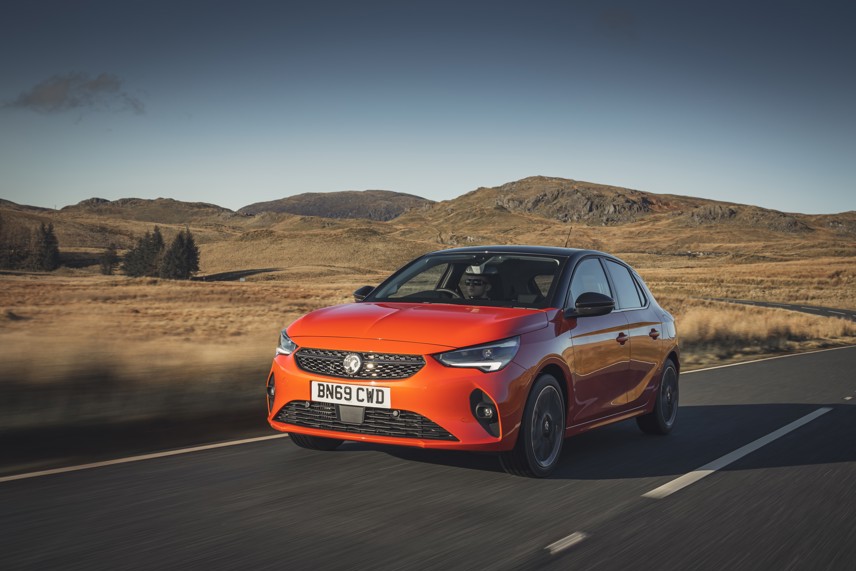Review
It’s been 15 years since the Vauxhall Corsa last outsold its arch nemesis the Ford Fiesta.
Buyers have flocked to the blue oval year-after-year, preferring the Fiesta’s sharper look and more engaging drive.
Not wanting to rest on its laurels, Vauxhall is hoping to claw back some of those Fiesta buyers with the all-new fifth generation Corsa.
It’s the first car developed under the PSA Group’s ownership of Vauxhall, which means it is based on the same platform as the recently launched Peugeot 208.
The Corsa is about as far from its predecessor as it could get. It has much sharper looks and comes with a range of much more efficient engines from Peugeot – including an all-electric version.
It’s not the first time a Vauxhall has shared DNA with its French stepbrother, of course.
The Grandland X and Crossland X show what PSA and Vauxhall can produce when they work together.
This time, Vauxhall had no choice but to use the family platform.
The car’s development was already well underway when PSA took over, so all the initial work was binned and the project was re-started.
As the Corsa is the brand’s best-selling model – 54,239 sales, compared with the Mokka’s 32,268 in 2019 – its success will be a big test of the partnership.
Vauxhall says the new Corsa is more than just a re-badging exercise and, while the Corsa and 208 are obviously related, there are several key differences.
Inside, the Corsa has avoided Peugeot’s futuristic i-cockpit, instead providing a more conventional set-up that might appeal to more traditional buyers.
It is easy to get comfortable in the Corsa, with its steering wheel and instruments where you’d expect them to be, unlike Peugeot’s layout.
The pedals sit a little far forward to suit taller drivers – a common problem in French superminis – but this can be somewhat resolved using the steering column’s lengthy reach adjustment.
While Peugeot’s infotainment system has been dropped straight in, offered with a seven- or 10-inch touchscreen, the Corsa features separate climate controls for easier use on the move.
This creates a weird – and totally unnecessary – conflict whereby the larger screen is flanked by two black bars displaying the cabin temperature, which is also shown on the climate control’s own display.
The system isn’t particularly slick either, with a dated feel to the user interface and slow response from the touchscreen.
Elsewhere in the cabin buyers can expect an array of hard, cheap-feeling, plastics and not much excitement.
There is plenty of space up front – although the rear is a little tight – and the seats are comfortable.
The night-and-day difference is to be found once you reach the open road.
Unlike the benign feel that has plagued pretty much every previous Corsa, the new version feels agile and responsive.
It is up to 10% lighter than its predecessor, shedding more than 100kg.
This gives improved efficiency, along with better performance and handling.
It’s no longer like a mini-MPV (Vauxhall’s words), now the Corsa is a proper contender against class-leading models such as the Fiesta.
The Peugeot engines inject a new lease of life into the car. We’re told the 1.2-litre 100PS unit is expected to be the most popular.
It promises 52mpg and CO2 emissions of 126g/km.
Performance is strong, for a small car, with 0-60mph dispatched in less than 10 seconds and power transmitted through a slick-shifting six-speed manual gearbox.
There is also an eight-speed auto available with this engine exclusively.
A single diesel engine serves up 102PS and promises up to 70mpg, making it an ideal sale to those that cover higher mileage.
During our test we were impressed that the car achieved north of 65mpg.
Both engines are remarkably quiet and offer similar levels of performance.
An entry-level 75PS petrol motor completes the combustion engine line-up, while the all-electric Corsa e – complete with a 205-mile range – is also offered.
Prices are cheaper than the equivalent Ford Fiesta by a significant margin. The trim line-up starts with SE, priced from £15,550 on-the-road. Equipment includes LED headlights, seven-inch touchscreen,
autonomous emergency braking, lane-keeping assist, alloy wheels, Bluetooth and digital radio.
SRI models (£18,700) include a Sport switch, which adds weight to the overly light steering and improves the engine note with a sound generator.
It also gains rear parking sensors and a host of sportier styling tweaks.
Both models can be enhanced with two option packs. Nav (£740) brings sat-nav and Premium (£780) introduces heated front seats and steering wheel, and automatic headlight control.
The Corsa Elite (£18,990) is fitted with the larger 10-inch touchscreen plus sat-nav, blind spot monitor, rear view camera and electric folding door mirrors.
At the top of the range, the Ultimate (£25,990) brings leather upholstery, matrix LED headlights, keyless entry and adaptive cruise control.
The Corsa-e is available in SE Nav or Elite trims, priced from £30,995.
While it lacks the excitement of the 208, the driveability of the Fiesta and the premium feel of a VW Polo, the Corsa is not significantly behind any of its rivals in any of those regards – making it a great all-rounder.
Factsheet
Price: £15,550-£33,310
Engine: 1.2 petrol; 1.5 diesel; electric
Performance: 0-60: 7.8-11.9 secs. Top Speed: 93-121 mph
Transmission: Six-speed manual; eight-speed auto
Efficiency: 48.7-70.6 mpg; 0-134g/km C02














